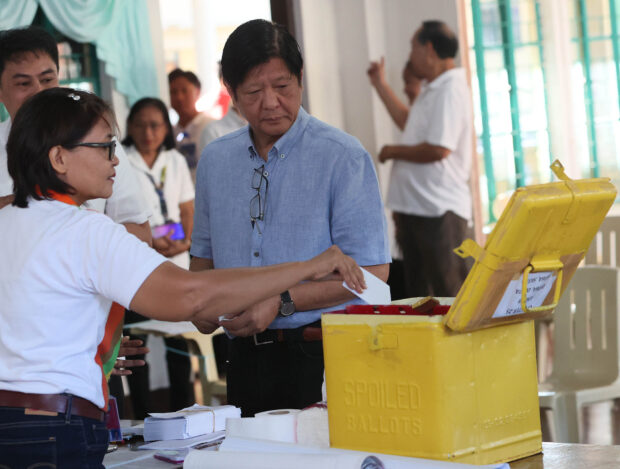
PRESIDENT’S CHOICES | President Ferdinand Marcos Jr. casts his vote at Mariano Marcos Memorial Elementary School to support the next barangay and Sangguniang Kabataan leaders in the family’s home city of Batac in Ilocos Norte. (Photo by MARIANNE BERMUDEZ / Philippine Daily Inquirer)
LAOAG CITY, Ilocos Norte, Philippines — Amid reports of rampant vote-buying and vote-selling in the barangay and Sangguniang Kabataan elections, President Ferdinand Marcos Jr. assured the public that authorities would go after those who committed these election offenses.
The president arrived at Mariano Marcos Memorial Elementary School in Batac City around 7 a.m. and took about five minutes to vote. He was not given any special treatment as he queued to get his ballot and later dropped it in the ballot box. Marcos had a small piece of paper with him which apparently had the names of candidates of his choice.
In an interview with reporters after casting his vote, the president acknowledged reports of rampant vote-buying right until the eve of Election Day, including in his home province of Ilocos Norte.
“Last night, there were some reports, even here in Ilocos Norte, that people were going around buying votes for the barangay elections,” he said. “We will do our part to enforce the laws that prohibit vote-buying.”
“Of course, our policemen, our Commission on Elections (Comelec) are doing everything to stop it. Whenever we receive such a report, I tell the police and the Commission on Elections to go there immediately, especially in the hot spot areas,” he added.
“As the government, we will do our part to continue to enforce all of the laws that do not allow the use of vote-buying as a part of the campaign,” Marcos said.
Wasted opportunity
At least two sources who spoke on condition of anonymity told the Inquirer that they received amounts ranging from P100 to P1,000 from some candidates.
Marcos emphasized that people who sell their votes waste an opportunity to put in office deserving candidates who will serve them well.
“My message to our countrymen is not to waste your right to choose who will lead in your places, in your barangays. You know that the barangay officials are the ones you will face every day. They’re the ones you run to for assistance to your problems,” he said.
“That’s why if the election is just done through vote-buying, your voice will be lost and you will not be able to choose who really deserves to lead in your barangay and who will really help you to face the various problems that you face every day that you bring to your barangay officials,” the President added.
‘Political dynamic’
But Marcos also acknowledged the political importance of barangay executives.
“As a national politician, I always say that of all the elected officials, it’s the barangay officials who can actually tell you, ‘I will deliver these many votes.’ When they say ‘I will deliver to you 350 votes from my barangay,’ expect it’s 350 — that’s true,” he said.
“For us politicians, the results of the barangay election are very important. And that’s why, in our assessment, sometimes the barangay election [campaign] gets heated up because it is really crucial as it is held at the very intimate personal level.
And that is why things get heated up very well which is what we want to avoid,” he added.
“I cannot overstate the importance of the results of the barangay elections. It’s very simple, I mean, the political dynamic is very simple. If, for example, you’re running for mayor and the majority of the barangay officials are on your side, are helping you, that’s a big thing. It will make it much easier [for you] to be elected at the local level,” the president also said.
“But this applies all the way up to the national level. For example, what happens here in the barangay elections — the results of the barangay elections today — are going to have an effect on the results of the midterm elections and then subsequently in the national elections,” he said further.
The Omnibus Election Code requires barangay elections to be conducted in a nonpartisan manner and prohibits political parties from supporting the candidates.
The winners, however, are not barred from joining political parties and supporting candidates during local and national elections.
‘No mercy’
Comelec vowed to press charges against those who disrupted Monday’s elections, including the politicians behind them, after the winning candidates have been proclaimed.
“Make no mistake about it. Once the smoke clears, we will show no mercy to all those responsible,” Comelec Chair George Garcia said at a news conference in Manila shortly after the close of voting.
On Monday, Garcia also said a governor and 13 mayors in Luzon, whom he did not identify, were being investigated by Comelec for involvement in vote-buying activities that took place “right in their own homes and other properties.”
Earlier, Garcia said a local government official in Malabon, whom he also did not identify, was being investigated for the apparent vote-buying activity discovered by authorities in neighboring Navotas City.
‘Surprised’
“We know the identities of those people, including the politicians who meddled in the elections, especially in Mindanao. They were caught on video and photos so we know everything they did,” warned Garcia.
The areas where the election violence incidents occurred were not among the 365 barangays tagged by the Philippine National Police under the highest or red security alert, “that’s why we were surprised,” he noted.
The Comelec chief said no untoward incidents were recorded in Negros Oriental and in Libon, Albay, which were placed under Comelec control earlier due to anticipated election-related violence.